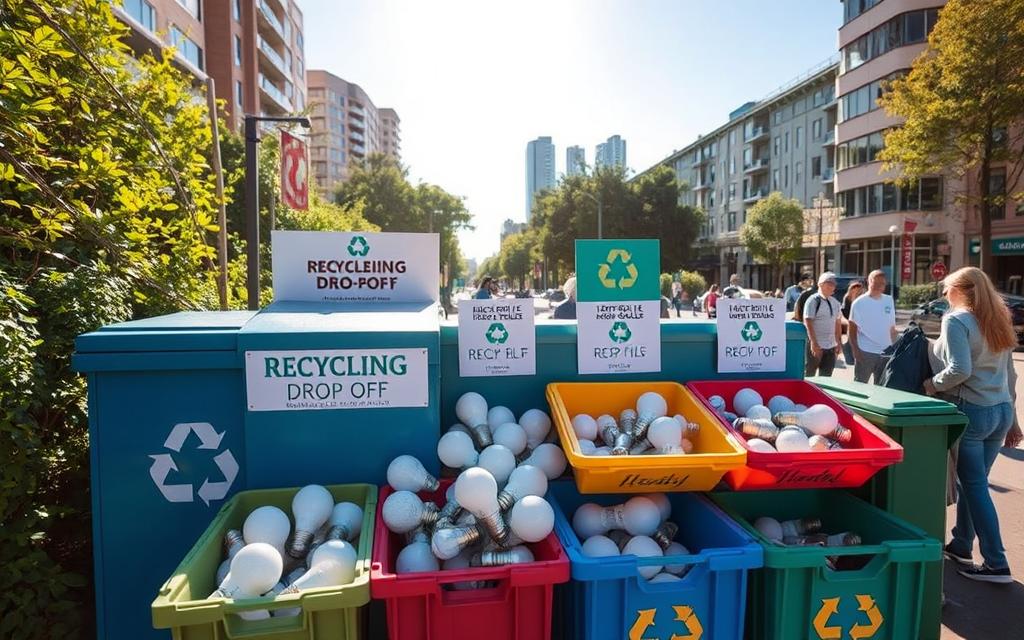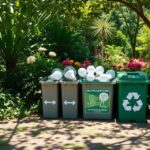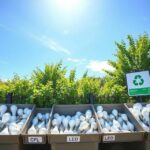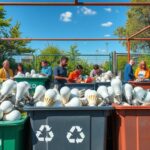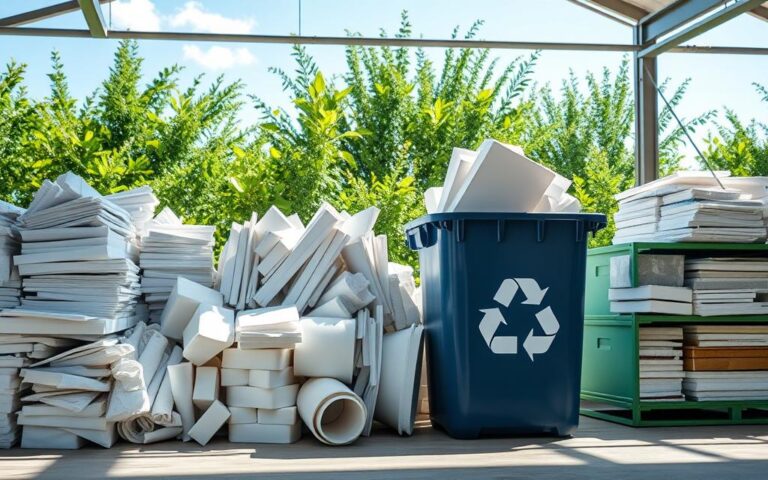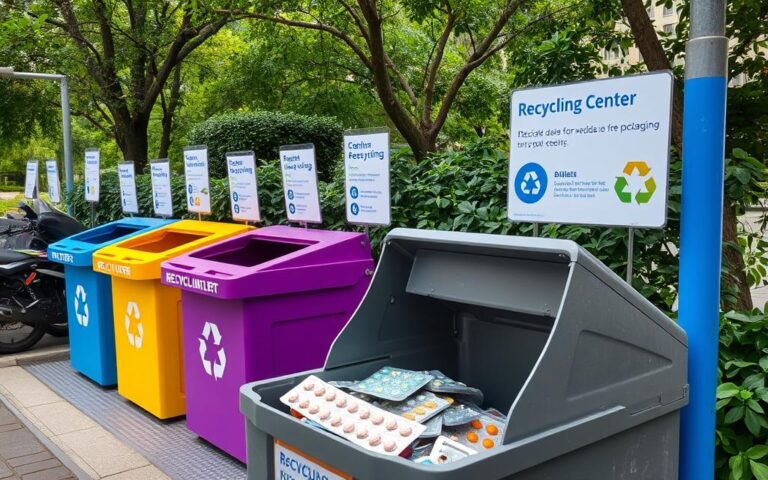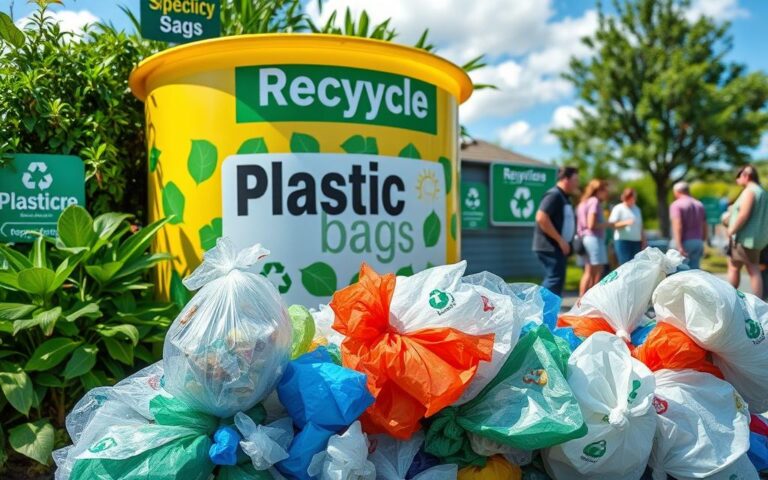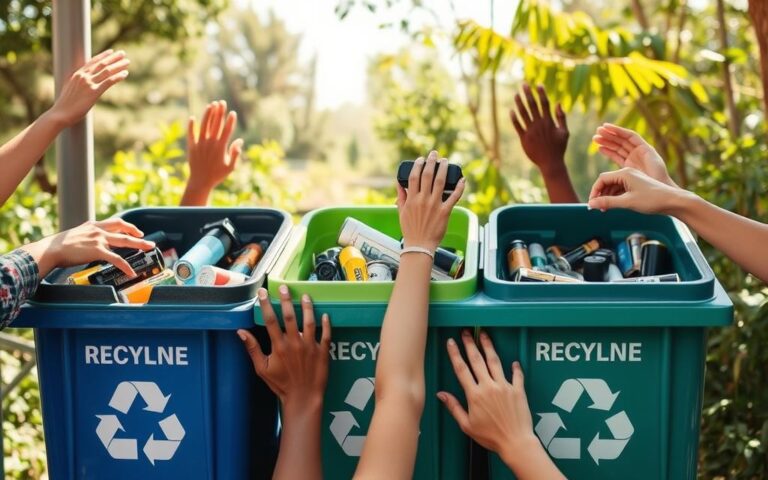Where Can I Recycle Light Bulbs Near Me? Local Drop-Off Points
Recycling light bulbs helps keep our planet safe. It’s important for safely getting rid of old bulbs. This guide shows where you can recycle them nearby. It explains why recycling is key to protecting the environment.
In places like California, you must recycle certain light bulbs by law. Options like sending them away in pre-paid packages are available. It’s important for both homes and businesses to know where to recycle. Doing so reduces harm to the environment and follows the law.
Looking for these recycling spots helps our world. It ensures dangerous materials, like mercury in some bulbs, are dealt with safely. Every effort to dispose of bulbs responsibly matters. It shows we’re committed to looking after our planet.
Why is Recycling Light Bulbs Important?
Recycling light bulbs matters more than you might think. It helps protect our environment and keeps us healthy. These bulbs often have harmful stuff like mercury inside. That’s bad news for the planet if they just get thrown away. Knowing why recycling matters can make a big difference.
Environmental Impact of Improper Disposal
Throwing away light bulbs the wrong way can harm the Earth. Toxic parts from the bulbs can get into the ground and water. This hurts plants, animals, and even our drinking water.
Every year, we throw away billions of bulbs, making trash problems worse. Recycling helps save important materials and stops nasty chemicals from causing harm.
Health Risks Associated with Hazardous Materials
When we don’t throw away light bulbs right, it’s dangerous. Breaking one can release harmful mercury into the air. That’s risky for everyone. Just one bulb could pollute lots of water if we’re not careful. Recycling these bulbs stops bad stuff from getting into our environment.
Legal Obligations in Certain Areas
Some places have strict rules about recycling light bulbs. If we don’t follow these rules, we could get fined. It also means we’re not doing our part to keep everyone safe and the Earth clean. Thankfully, more laws are being made to help us recycle better. Being eco-friendly not only meets these rules but also makes our communities better places to live.
How to Prepare Light Bulbs for Disposal
Getting light bulbs ready for disposal is key for safety and the planet. Knowing how to handle bulbs safely aids in smooth recycling. Proper packaging also helps avoid accidents and eases the transport of these risky materials.
Safety Precautions When Handling Bulbs
When tossing out light bulbs, being safe is crucial. Always wear gloves to avoid cuts from broken glass. Also, keep pets and kids away from disposal areas. This careful approach keeps dangerous materials in check and lowers injury risks.
Proper Packaging to Prevent Breakage
Packing light bulbs well for recycling is vital to stop them from breaking on the way. Use strong boxes or padded containers to protect the bulbs. For CFLs and fluorescent tubes, wrap each bulb in bubble wrap or newspaper for extra safety. This not only keeps the bulbs safe but also keeps harmful materials contained until recycling.
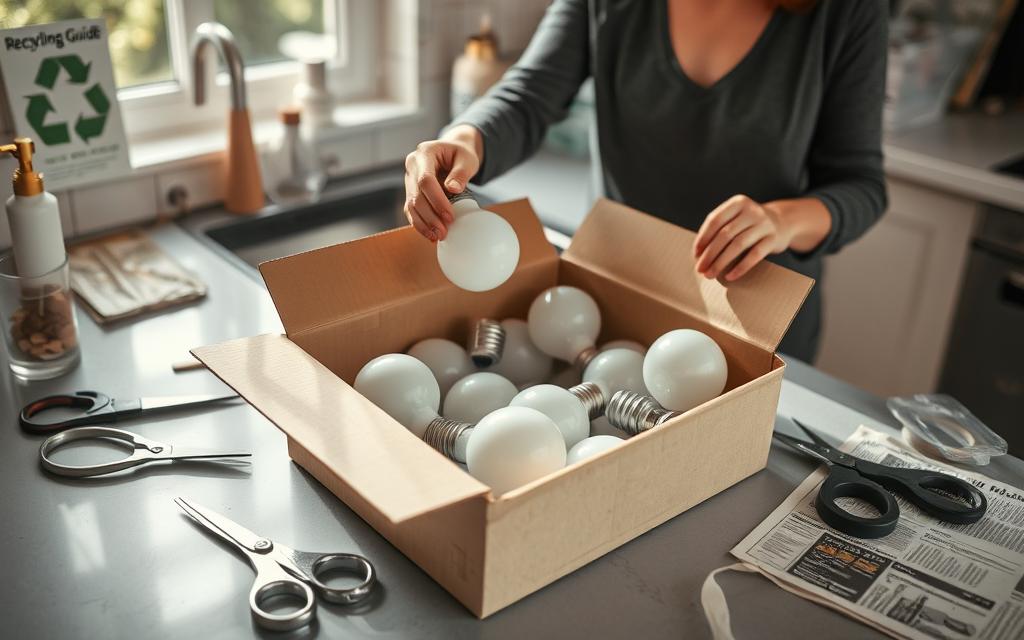
Where Can I Recycle Light Bulbs Near Me?
Recycling light bulbs helps protect the environment and our health. You can dispose of them at local recycling centres, retailer recycling programmes, and municipal waste facilities. These places follow strict rules to safely manage harmful substances like mercury.
Local Recycling Centres and Their Services
Local recycling centres usually take light bulbs and give clear directions for their safe disposal. Going there gives you useful info on recycling various lamp types properly. Make sure to check if they take your bulb type before going. Help ME Recycle is a great tool to find the closest centres.
Retailer Recycling Programs Available
Many shops have special recycling schemes for old light bulbs. Big store chains often join these efforts, letting you bring back used bulbs when buying new ones. This easy method helps avoid dumping harmful materials into landfills. It’s good to ask local shops if they offer this recycle service.
Municipal Hazardous Waste Facilities
Local waste facilities are good for disposing of dangerous waste, including light bulbs. They have the right equipment and processes for safe recycling. They might have specific days for you to drop off waste, so check their timetable before visiting.
How to Dispose of Different Types of Light Bulbs
Learning to throw away different light bulbs correctly is key for the planet’s health and our safety. Each type has its own way to be discarded because they can harm us and nature if not done right.
Incandescent Light Bulbs Disposal Guidelines
Throwing away incandescent bulbs is easy as they are safe to go with the normal trash. But, if one breaks, wrap it in thick paper to avoid cuts. Recycle centres usually don’t take them because they’re not worth much for reclaiming.
Some people get creative and turn them into decoration instead of throwing them out.
Safe Handling and Disposal of CFL Bulbs
CFL bulbs have a bit of mercury, so they need careful disposal. Throwing them away wrongly can harm the environment. It’s best to take them to special recycle places or join local recycling events.
Stores like home improvement shops often have ways to recycle CFLs safely.
LED Bulbs: Best Practices for Recycling
LED bulbs are easier on the environment but still need proper disposal. Although non-toxic, some places treat them as special waste because of the metals used inside. Shops like Lowe’s and Home Depot help recycle LEDs responsibly.
Amazingly, 95% of an LED bulb can be recycled. This makes it great for the environment to recycle them.
To recycle well, check out local options. Make sure to follow your area’s rules to keep your community and earth safe.
Local Drop-Off Points for Light Bulbs Recycling
Finding reliable spots for light bulbs recycling is crucial. It helps ensure they’re disposed of properly, reducing harm to the environment. Many places run collection events or have facilities for safe recycling. By using these services, we support good waste management and protect our planet.
One-Day Collection Events in Your Area
Communities often hold one-day events for hazardous waste like light bulbs. These are usually announced beforehand, so it’s good to sign up early. By joining, you can get rid of your bulbs and other risky waste safely and easily.
Long-Term Collection Facilities Availability
There are also places that take light bulbs all year round. Local governments work with waste authorities to set up these collection spots. They’re ready for various hazardous materials and open at times that fit most people’s schedules.
Finding Drop-Off Locations Through Local Resources
You can find your closest recycling point with help from local resources. Municipal waste departments’ websites list collection events and permanent locations. Libraries and notice boards in the community also share this important information. This way, you’re always in the loop about where to recycle.
Additional Resources for Light Bulb Recycling
Finding the right light bulb recycling resources is essential. It helps you dispose of bulbs safely. You can ask local authorities about how to recycle, stay safe, and understand disposal options. Getting the latest waste management contact information makes things easier. This way, you can quickly reach out for help and find online recycling resources.
Contact Information for Local Waste Management Authorities
Your local waste management is a great place to start for recycling info. They offer details on what can be recycled, community programs, and how to ask about hazardous waste.
- Accepted materials for recycling.
- Available community programmes.
- Contact procedures for hazardous waste inquiries.
In Diamond Bar, CA, for example, you can call the Public Works Department at (909) 839-7015. They can answer your waste management and recycling questions.
Online Resources for Finding Recycling Locations
Many online recycling resources exist to help find nearby recycling spots. Local government websites usually have interactive maps and lists. They show:
- Retail establishments offering free take-back programmes.
- Municipal recycling centres and hazardous waste facilities.
- One-day collection events for household hazardous waste.
These tools boost recycling efforts by giving easy access to needed info and correct locations.
| Type of Resource | Description | Contact/Website |
|---|---|---|
| Public Works Department | Local authority for waste management inquiries and recycling programmes. | (909) 839-7015 |
| Ken’s Ace Hardware | Drop-off point for light bulbs and batteries in Diamond Bar, CA. | Mon.-Sat. 8 a.m.-7 p.m.; Sun. 9 a.m.-5 p.m. |
| Online Recycling Resources | Websites for finding recycling locations and information. | [Local Government Recycling Site] |
Conclusion
Discussing light bulbs, we see how crucial proper disposal is for our planet and health. It’s key to know how to throw away different light bulbs. CFLs and HIDs, for instance, have mercury and need careful handling. Not doing so can harm our neighborhoods with toxic vapors.
Stores like Home Depot and IKEA help us recycle right. They have special bins for safe disposal. They also give free services to encourage us to recycle. Using these services, we can stop over 670 million harmful light bulbs from getting tossed wrongly every year.
To wrap up, knowing about light bulb recycling is vital for our environment’s health. By following simple steps and using local recycling options, we all can help. Let’s all get involved and share knowledge for our communities’ betterment.
FAQ
Why is it important to recycle light bulbs?
Recycling light bulbs is vital because they can contain harmful stuff like mercury. This can harm the environment if thrown away carelessly. By recycling, we stop harmful substances from polluting our soil and water. This shields our ecosystems and keeps our drinking water safe.
What safety precautions should I take when handling light bulbs?
It’s smart to wear gloves to avoid getting cut by broken glass. This also prevents touching any dangerous chemicals. Also, ensure that pets and kids stay away from places where you store or throw out bulbs. This helps in avoiding accidents.
Where can I find local recycling centres that accept light bulbs?
Many places have special recycling centres for light bulbs. Always check with your local area’s waste management services for details. They can tell you where these centres are and how to use them properly.
How should I dispose of incandescent light bulbs?
You can throw away incandescent bulbs with your normal rubbish. But, if they break, wrap them up in paper to avoid injuries. Unlike others, these bulbs often can’t be recycled. But, there are fun DIY projects to reuse them in creative ways.
Are there one-day collection events for light bulb recycling in my area?
Yes, many areas organize special days for collecting harmful waste like light bulbs. These events are usually announced beforehand. You might need to sign up first. Look out for notices about when and where these will happen.
How can I contact local waste management authorities for assistance with recycling?
If you need help recycling light bulbs or electronic waste, get in touch with your local waste management. They can tell you what materials they accept and inform you about recycling programmes.
What are the best practices for disposing of CFL and LED bulbs?
Because CFL bulbs have mercury, they must go to a special centre. LEDs are less dangerous but should still be recycled. Check your area for places that accept these bulbs for recycling.
How can I find drop-off locations for light bulb recycling?
To find out where to recycle light bulbs, ask your waste management authority. You can also look at community boards or online recycling sites. There are often permanent drop-off sites and specific dates for disposing of hazardous waste.

